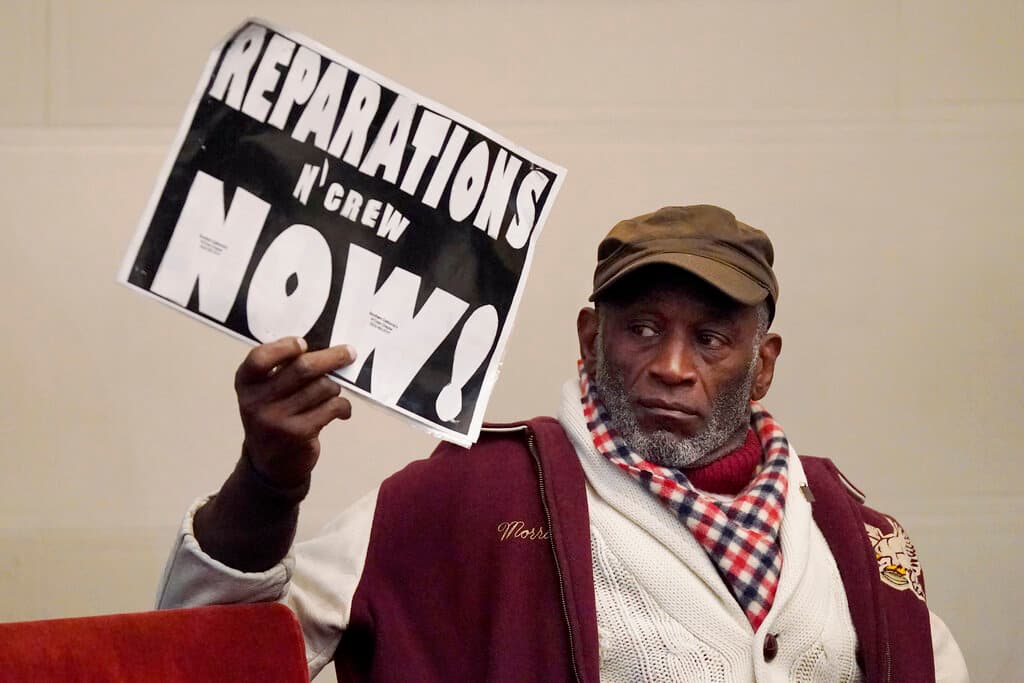Debate Over Reparations Comes to America’s Capital City
Across the country, local legislators are setting up committees to investigate reparations and make policy recommendations.

After sprouting up in cities around the country in recent months, the growing movement seeking reparations both for descendants of slaves and victims of racism is coming to the nation’s capital.
Ten of the 13 Washington, D.C., city council members have put their support behind legislation that would create a committee to study a path forward for reparations.
The legislative effort, spearheaded by Council Member Kenyan McDuffie, would establish a committee to develop proposals for payments to “African Americans directly wronged and traumatized by the ills of slavery, Jim Crow, and structural and institutional racism.” In other words, not just descendants of slaves.
The legislation also seeks to create a slavery database to inform the reparations proposals, as well as a fund through which to pay out any approved programs.
“We do not live in a post-racial society, and racial equality has not been achieved,” Mr. McDuffie wrote in his introduction of the bill. “If ever we are to achieve racial equity in this country, it will require an official recognition of the role of government-sanctioned slavery, segregation, and racism that denied wealth-building opportunities to Black people. We must be intentional in our efforts so that Black people might finally be compensated for their ancestors’ labor and for the continuing effects of policies and systems designed to suppress their potential to build wealth.”
Across the country, local legislators are setting up committees to investigate reparations and make policy recommendations. The most prominent case so far is that of San Francisco, where the commission has recommended $5 million to Black residents of the city. The proposal is now under consideration by the city council.
The D.C. council effort comes as pressure mounts on other policymakers there at the federal level.
Senator Booker of New Jersey introduced last month a bill that would create a national commission to develop reparation proposals for descendants of slaves. Reparations, the legislation says, would be part of a “formal apology on behalf of the people of the United States for the perpetration of gross human rights violations and crimes against humanity on African slaves and their descendants.”
Per Mr. Booker’s legislation, the committee would also study how to end any federal laws that “continue to disproportionately and negatively affect African Americans as a group.”
“Many of our bedrock domestic policies that have ushered millions of Americans into the middle class have systematically excluded Black individuals,” Mr. Booker said. He suggested that reparations could “bring our country one step closer to our founding principles of liberty and justice for all.”
Mr. Booker’s bill has been backed by a host of prominent liberal policy groups, including the American Civil Liberties Union, the Anti-Defamation League, the National Association for the Advancement of Colored People, and Amnesty International.
Meanwhile, activists are seeking an executive order from President Biden to establish such a commission by Juneteenth, according to a letter sent to the White House earlier this week by liberal faith leaders.
“The US cannot mend its political, economic, and social brokenness until it addresses its own transgressions against people of African descent,” the faith leaders wrote.
The American public, though, remains broadly opposed to reparations. More than 65 percent of Americans, according to a recent Pew survey, said they oppose policies that include paying the descendants of enslaved persons. Among Black Americans, however, support ran at about 77 percent.

